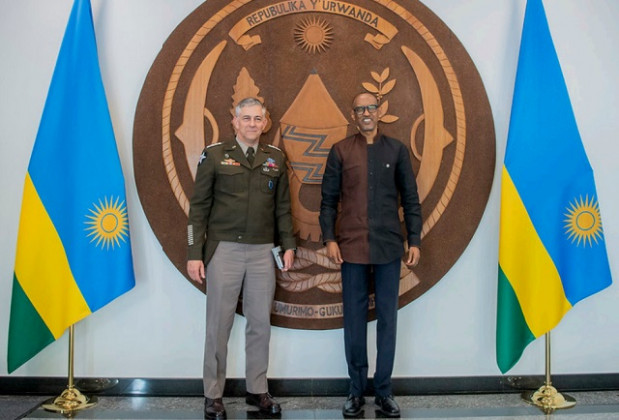KAMPALA, UGANDA: U.S. Army Gen. Stephen Townsend, commander, U.S. Africa Command, concluded his East Africa and Horn of Africa nine-day tour without visiting one notable capital: Kampala.
The omission was marked as Gen. Townsend took his trip at a time America appears to be giving Uganda the silent treatment.
Uganda is considered a key voice on regional security matters but, it appears Townsend’s omitting a meeting with President Yoweri Museveni was not by accident.
When The Independent made a query to the U.S. Africa Command about why Uganda had been skipped, a spokesperson evaded the question.
“General Townsend was unable to travel to Uganda during this trip however U.S. Africa Command greatly appreciates Uganda’s military contributions to ATMIS and to security in Somalia,” was the response.
The reference to ATMIS or the African Transition Mission in Somalia was significant as Uganda has been hailed internationally for its role in the relative peace and stability of Somalia. Uganda has always had the largest troop contingent in the Horn of Africa nation since the U.N. and African Union authorised a peacekeeping mission in 2007.
“Whether a US General passes here or not, it will not change Uganda’s role in this region,” said Brig. Felix Kulayigye, the spokesperson of the Uganda Peoples Defence Forces. “It is no big deal.”
Uganda was also not invited to the African Land Forces Summit that took place in March at the Maneuvre Centre of Excellence, Georgia, U.S. in March.
Forty African nations were represented at the summit; including some of Uganda’s neighbours like Rwanda and other countries like Ghana and Malawi with less notable security responsibilities in their regions and continentally.
In addition to the snub by Gen. Townsend, Uganda did not have any representative at the East African Security Forum (EASF) that took place on May 11. According to a report from the Forum, more than 50 U.S. government officials working in the various East African countries attended the meeting.
Uganda is battling U.S. sanctions with a number of top army officers like Gen. Kale Kayihura, Maj. Gen. Abel Kandiho, having been targeted by the U.S. State Department for alleged roles in human rights abuses like torture and illegal detention of the political opposition.
In addition, a number of high ranking government officials and businesspeople have been placed under travel ban by the U.S.
Gen. Townsend visited Somaliland, Somalia, Djibouti, Kenya, Angola before visiting Rwanda, Uganda’s neighbour to the South. The U.S. has important national security interests in the security and stability of East and Horn of Africa regions.
In Kenya, Townsend and U.S. Chargé d’Affaires to Kenya Eric W. Kneedler met with Kenyan President Uruhu Kenyatta.
Townsend concluded his trip just as the U.S. was renewing its relationship with Somalia where a reported 450 troops were ordered to deploy by U.S. President Joe Biden. The U.S. General held a meeting with newly-elected Somali President, Hassan Sheikh Mohamud, and the two discussed how the arriving U.S. forces could work with Somalia National Army (SNA).
The U.S. troops will also work closely with the 22,000 peacekeeping troops under ATMIS. Uganda has a 6,000 troop contingent in the mission in Somalia where it has maintained a presence since inception of the mission fifteen years ago.
On his trip, Townsend visited Camp Lemonier in Djibouti which hosts the only permanent U.S. military base in Africa where he presided over change of command for Combined Joint Task Force – Horn of Africa (CJTF-HOA).
It appears that whereas there remains intensive engagement between the U.S. and Uganda on security cooperation, there is also a deliberate move by the superpower to distance itself from a troublesome ally whose record on human rights keeps deteriorating.
A U.S. government report released in March indicated that the UPDF had the highest number of trainees among African countries who underwent foreign military training by the U.S. Department of Defence.
The report covering the financial years of 2020 and 2021 indicated that Uganda had 5049 individual students for the trainings that took place among 46 African countries. Uganda had more than double the students of the country with the second highest number of trainees- Rwanda at 2195 trainees.
US-Africa Leaders summit
As the anticipated U.S. Africa Leaders summit draws closer, there are doubts on whether President Museveni will be invited for the summit having been left out of a democracy summit hosed by US President Joe Biden in December 2021.
The democracy summit was a campaign pledge by Biden in 2020 as he vowed to set a different path from the one laid out by his predecessor Donald Trump who schmoozed with leaders accused of stifling dissent and jailing opponents.
With arrests and detention of political opponents becoming synonymous with Museveni’s government since the 2021 election, his opponents at home and in the diaspora are working aggressively to ensure Museveni, in his 36th year in power, does not get anywhere near the summit. Museveni attended the inaugural US-Africa Leaders summit held in August 2014.
US Senator Robert Menendez, the chairman of the Senate Forest Relations Committee, penned a letter to Biden about the issue.
“I am troubled by president Museveni’s potential inclusion in the US-Africa Leaders Summit announced for 2022,” Menendez writes and adds, “Extending invitations to leaders who benefit from corruption, show a lack of commitment to democracy, or trample human rights norms will undermine important work this administration is doing in Africa and around the world to promote democracy, combat corruption, defend human rights and advance the values and interests of the United States.”
If you would like your article/opinion to be published on Uganda’s most authoritative news platform, send your submission on: [email protected]. You can also follow DailyExpress on WhatsApp and on Twitter (X) for realtime updates.



